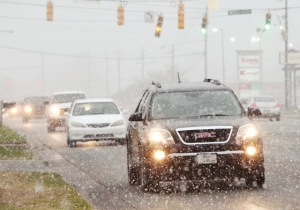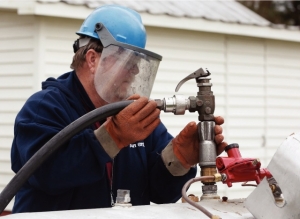Cold weather causes flurries and preparation
By John Joyce
Published in News on January 5, 2016 1:46 PM

News-Argus/CASEY MOZINGO
Cars traveling down Berkeley Boulevard late Monday afternoon use their lights and windshield wipers to increase visibility as snowflakes, some as large as quarters, fall from the sky.

News-Argus/CASEY MOZINGO
Roy Speight, with AmeriGas, fills an LP gas tank on Wayne Street in Fremont Monday afternoon.
For about half an hour Monday, between 4 and 4:30 p.m., Goldsboro and parts of Wayne County were hit with driving winds and heavy snowfall.
Despite the sudden burst of winter weather, there was little to no accumulation according to the National Weather Service in Raleigh. "We had a surge of colder air in the middle to upper atmosphere," meteorologist Keith Sherburn said.
He also said there was a period of instability in the lower atmosphere. That "mixing" increased what were originally forecast to be flurries into near whiteout conditions for a brief period.
"I think in general the winds were also a result of that instability," Sherburn said.
Today temperatures have dipped closer to a record low than last week's warm spell came to setting any record highs, he said.
"On average, we have been running about 10 degrees above normal," he said.
Temperatures are expected to linger in the 30s and possibly climb to the 40s later today, and conditions will continue to warm throughout the week. It will be a while before the area sees snow again, Sherburn said.
The drastic change in weather sent some local residents scurrying to the grocery store for milk and bread, while others simply called to order propane or gas to fill their tanks to heat their homes.
AmeriGas District Manager Larry Mizell said calls for service are up this week as the mercury was scheduled to fall.
"With the mentions of flurries we've seen an increase in our delivery requests," he said. "Phone calls have increased 80 percent, relative to the temperature increase."
Last week, before the drop in temperatures, the company was scheduling one to three deliveries per day. This week, their scheduled stops have increased to between three and five.
